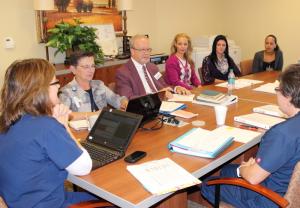Dana Ayars, Crystal Cobb, and Victoria Hines study nursing at Delaware Tech Owens Campus. As a requirement for their mental health class, they visited the Delaware Hospice Center in Milford where they sat in on care team meetings and visited patients and families.
Delaware Tech’s nursing students complete clinical rotations in a variety of settings depending on the class. They weren’t looking forward to their clinical rotation at the Delaware Hospice Center. Hines said, “I was expecting it to be like a long-term care facility, but quite depressing. However, this one place, which I didn’t expect to like, has been my favorite!”
Ayars agreed, “I expected a typical facility, with med carts rolling around and nurses running around. It wasn’t like that at all. It was like a home, with families cooking in the kitchen. A volunteer baked cookies and passed them out. It really changed my perspective completely.”
“First, you have a feeling of warmth when you walk through the door,” said Hines. “It’s the décor, the atmosphere, the warmth of the center’s staff.” Ayars added, “I love the French doors opening onto a veranda where you can roll the patient’s bed outside or simply open the doors for fresh air. And the view outside is calm, serene, and adds to the whole experience.”
Students also discussed the clinical experience. Ayars said, “It was more calm and relaxed here, whereas in hospitals, nurses are focused on meds, taking vitals, and required procedures. Here, the focus is on the patient’s comfort. They receive a lot more attention.”
Hines said, “In long-term care, a nurse may have 40 persons to care for. It’s frightening to think that someone might be taking their last breath and no one would be there to hold their hand. It was nice to see how different it is here at the center.”
The volunteers impressed Cobb, as well. “An important thing that I noticed is that Delaware Hospice Center volunteers have usually been here before in the same position as family members. To me, that says a lot."
The students sat in on care team meetings and spoke with patients and families to learn about their experiences there. The Delaware Hospice Care Team includes a medical director, nurse, certified nursing aide, social worker, chaplain and grief counselor.
Hines said, “I found it really interesting to see how much say the nurses had in their care. It’s so different in the hospital settings. The nurses and doctors discussed options and collaborated, rather than the doctor simply giving orders for the nurses to follow."
Ayars said, “It’s less intimidating; you slow the pace down and focus on the patient. There’s more time for discussions, planning, learning what the needs of the patient and family are.”
Cobb said, “The care team discusses who comes to visit, who talks to them, whether or not they have funeral arrangements in place. They are concerned with anything they can do to help the family who is already dealing with so much.”
“Hospice nursing requires a good attitude, a desire to care, common sense, problem-solving skills, the ability to have an open mind, a sense of responsibility, and the ability to prioritize,” said instructor Laurie Vonasek.
Cobb said, “Therapeutic communication is critical here. I remember one day when we met a gentleman on the grounds outside. He was about to lose his wife of 55 years. It was hard to see what he was going through, but I think he needed someone to talk to, and it felt good that he found us and opened up to us. That was a valuable experience.”
Hines said, “It made me realize that besides passing meds, you’re a support person. Ms. Vonasek asked if she could just give him a hug, and he said he would take anything he could get. It made me cry. It was sad to see, but I realized also that he just needed someone to talk to. Nursing was no longer about the medications, but just about being there for him, because he had no one else.”
“I also think it will be valuable in terms of helping to place patients,” added Ayars. “When I’m in practice, if someone needs hospice upon leaving the hospital, I will feel much more comfortable speaking about it. I can share with families how great my experience was here.”
Cobb said, “I think it has changed my whole outlook. Before coming here, I would have said I didn’t want anything to do with it; I wouldn’t know what to say to people in these situations. Also, as far as my nursing career, I would have never considered going into hospice. But seeing it firsthand, I would absolutely consider it now.”
Visit www.dtcc.edu to learn more about Delaware Tech programs. For more information about Delaware Hospice call 800-838-9800 or go to www.delawarehospice.org.















































